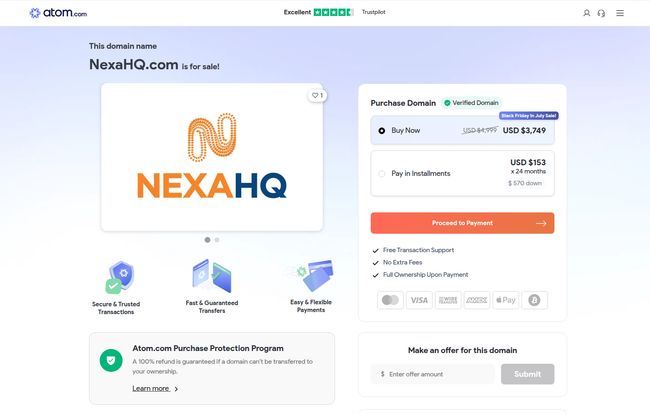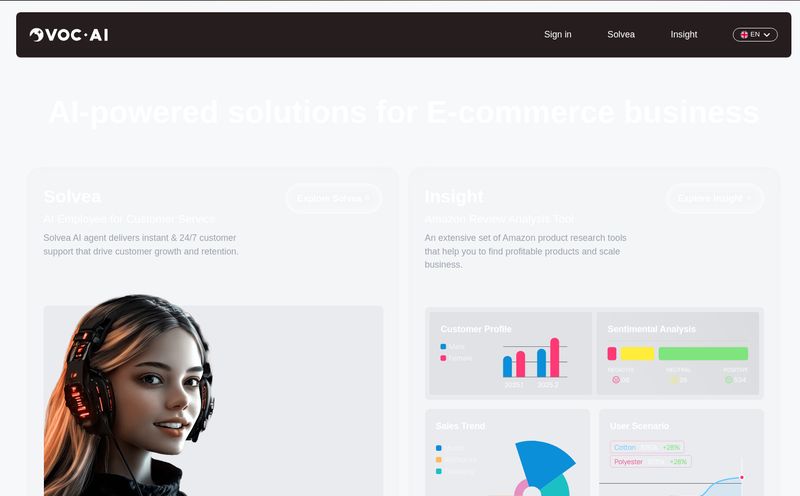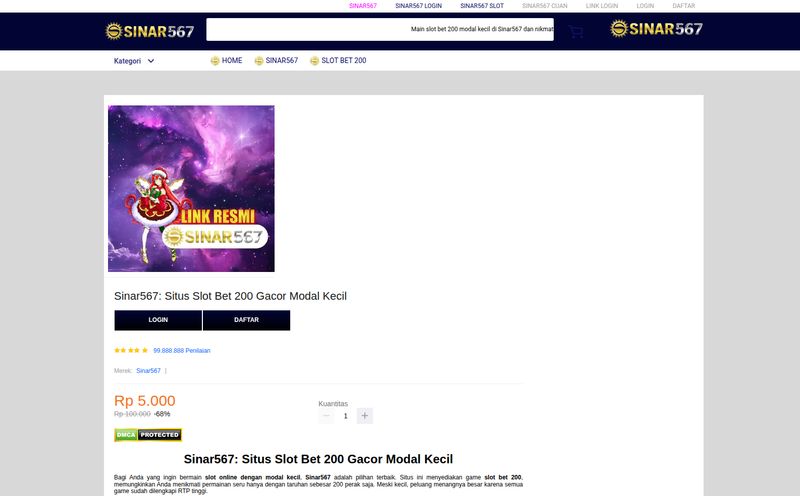I’ve been in the SEO and traffic game for years, and if there’s one thing that’s a constant headache, it’s data. Raw, beautiful, terrifying data. We all want to be “data-driven,” but who has the time to become a SQL wizard or wrestle with a million-row Excel sheet that’s threatening to crash your computer? It’s the perennial problem. We’re drowning in information but starved for wisdom.
Every so often, a tool pops up on the horizon that feels like the answer. A real game-changer. A while back, I stumbled upon one called Nexa. The pitch was intoxicating: an AI business analyst that could do the heavy lifting for you. Just ask it questions in plain English, and it would spit out charts, tables, and insights. It was supposed to be the bridge over the troubled waters of data analysis for people like you and me.
But here’s the funny thing about the tech world. Sometimes, the brightest stars burn out the fastest. Nexa, for all its promise, seems to have become a digital ghost.
What Was the Big Idea Behind Nexa?
Let's paint a picture. Your boss wants a report on which marketing channels drove the most Q3 conversions for customers in the Midwest. In a typical office, this request kicks off a whole chain of events. You file a ticket with the data team. You wait. You get a spreadsheet back that isn't quite what you asked for. You try to pivot table your way to glory but end up with something that looks like a modern art project gone wrong. Sound familiar?
Nexa’s goal was to kill that entire, painful process. It was designed to be your on-demand analyst. You’d connect your database (it supported PostgreSQL, MySQL, and even basic CSVs), and then you could just… talk to it. Literally. You could type, “Show me a bar chart of monthly recurring revenue for the last 12 months,” and poof, the AI would write the SQL query, run it, and generate the chart.
The promise was a 5-12x reduction in analysis time. That’s not just an improvement; that’s a fundamental shift in workflow. It’s the difference between having an idea and getting an answer in three minutes versus three days. For small teams or non-technical founders, that kind of speed is everything.

Visit Nexa
The Features That Made Us All Lean In
So what was under the hood? It wasn’t just a simple chatbot layered on a database. Nexa had a few core features that made it so compelling.
Your Personal SQL Ghostwriter
The main event was its AI-powered SQL generation. This is the magic trick. It took your normal, human question and translated it into the structured language that databases understand. For anyone who has ever stared at a `JOIN` statement with pure dread, this is the holy grail. It promised to democratize access to the data warehouse, turning it from a locked fortress into a public library.
Notion-Style Dashboards on the Fly
Getting the data is one thing; presenting it is another. Nexa had this brilliant built-in dashboarding tool that they described as being “Notion-like.” This is smart. People love Notion’s clean, block-based interface. Instead of fumbling with a clunky, old-school BI tool, you could drag and drop your AI-generated charts into a clean, shareable report. You could add text, context, and share a single link with your team. Simple. Effective.
The Good, The Bad, and The AI-Dependent
No tool is perfect, of course. Based on what we knew, Nexa had some clear strengths and some pretty predictable weaknesses. On one hand, the ability to empower a whole team to do their own analysis without code is massive. It saves time, it saves money on specialized hires, and it fosters a culture where people can actually use the data they’re collecting. They also claimed it was secure, with read-only access and a promise not to use your data for public model training—a big deal in the age of ChatGPT.
However, there were hurdles. It relied on OpenAI’s GPT-4, which means its intelligence was outsourced. If OpenAI had a bad day, so did Nexa. A bigger issue, for me at least, was that it couldn't clean data. As anyone who works with real-world data knows, 90% of the job is cleaning up the mess. Mismatched formats, null values, human error… Nexa could only analyze the data it was given, it couldn’t fix it. And like all current AI, it could make mistakes. You’d still need a human to sanity-check the results, which is a crucial caveat.
What Was the Price of This Magic?
Nexa seemed to have a pretty straightforward pricing plan. There was a 14-day free trial that gave you 50 AI prompts to play with. After that, the Standard Plan started at $85 per month. That got you 150 prompts per month and, importantly, included unlimited users and dashboards. The price scaled up based on how many prompts you used.
Honestly, $85/month for what was promised feels like a steal. A single freelance data analyst can cost that much per hour. If Nexa could reliably answer even a handful of critical business questions each month, it would pay for itself almost instantly. It was priced for growth, aimed squarely at startups and SMBs who feel the data pain most acutely.
So, Where in the World is NexaHQ?
This is where our story takes a turn. If you go looking for Nexa today, you’ll find… well, not much. The pricing page URL that was once shared is now a 404 error. Even more telling, the domain itself—`NexaHQ.com`—is listed for sale on Atom.com. Last I checked, the asking price was a cool $3,749.
A domain for sale is the startup equivalent of a “For Lease” sign in a storefront window. It’s over.
What happened? We can only speculate. This is an incredibly common story in the AI gold rush. Perhaps they were acqui-hired, with a larger company buying the team and tech and shelving the brand. Maybe they ran out of runway before they could gain enough traction. Or maybe they realized the technical challenges, like data cleaning and AI accuracy, were just too big to overcome in a way that would satisfy customers. The space is also getting crowded, with giants like Microsoft and Google building similar natural language features directly into their own massive platforms.
The Lesson from a Digital Ghost
Even as a ghost, Nexa tells us something important. The need for a tool like this is enormous and undeniable. The dream of a truly conversational, no-code data analysis platform hasn't vanished, even if Nexa itself has.
Nexa was a pioneer, or at least an early settler, in a territory that is now being swarmed. It showed what was possible and, in its absence, highlights the challenges that still remain. It’s a reminder that a great idea and a slick interface are only part of the battle. The plumbing underneath—the data quality, the reliability, the trust—is where the war is won.
So, here’s to Nexa. A great idea that, for whatever reason, didn't quite make it across the finish line. It may be gone, but the problem it tried to solve is more relevant than ever. And I, for one, will keep my eye on the horizon, waiting for the next ship to come sailing in.
Frequently Asked Questions about Nexa
- What was Nexa?
- Nexa was an AI-powered business analyst tool designed to automate data analysis. It allowed users to ask questions in plain English, and the platform would automatically write SQL code, generate tables and charts, and build shareable dashboards, all without requiring the user to have technical coding skills.
- How did Nexa work?
- It connected to a user's data sources like MySQL, PostgreSQL, or a CSV file. It then utilized a large language model (like GPT-4) to interpret natural language questions, translate them into SQL queries, execute them against the database, and visualize the results.
- What happened to the Nexa platform?
- The exact reason is unknown, but the platform is no longer active. Its website returns a "Page not found" error, and its domain name, `NexaHQ.com`, is currently listed for sale, indicating the service has been discontinued.
- How much did Nexa cost?
- Nexa offered a 14-day free trial. Its paid offering was a Standard Plan starting at $85 per month, which included 150 AI prompts, unlimited users, and unlimited dashboards. Pricing would increase with higher usage of AI prompts.
- Are there good alternatives to Nexa?
- Yes, the idea behind Nexa is being pursued by many companies. Users looking for similar functionality could explore AI features within established BI platforms like Microsoft Power BI and Tableau, or look at other AI-native data analysis startups. The field is evolving rapidly, with new options appearing frequently.
- Was Nexa a secure tool for business data?
- According to its own documentation, Nexa was built with security in mind. It used read-only access to databases to prevent accidental data modification and stated that user data was not used to train public AI models. However, as with any third-party tool, users would have needed to perform their own security due diligence.
Reference and Sources
- NexaHQ.com Domain Listing on Atom.com
- Information on Nexa's features and pricing was based on archived product data. The original pricing URL (https://www.nexahq.com/pricing) is no longer active.
- For context on the challenges facing AI startups, see reporting from sources like TechCrunch on the AI industry.



